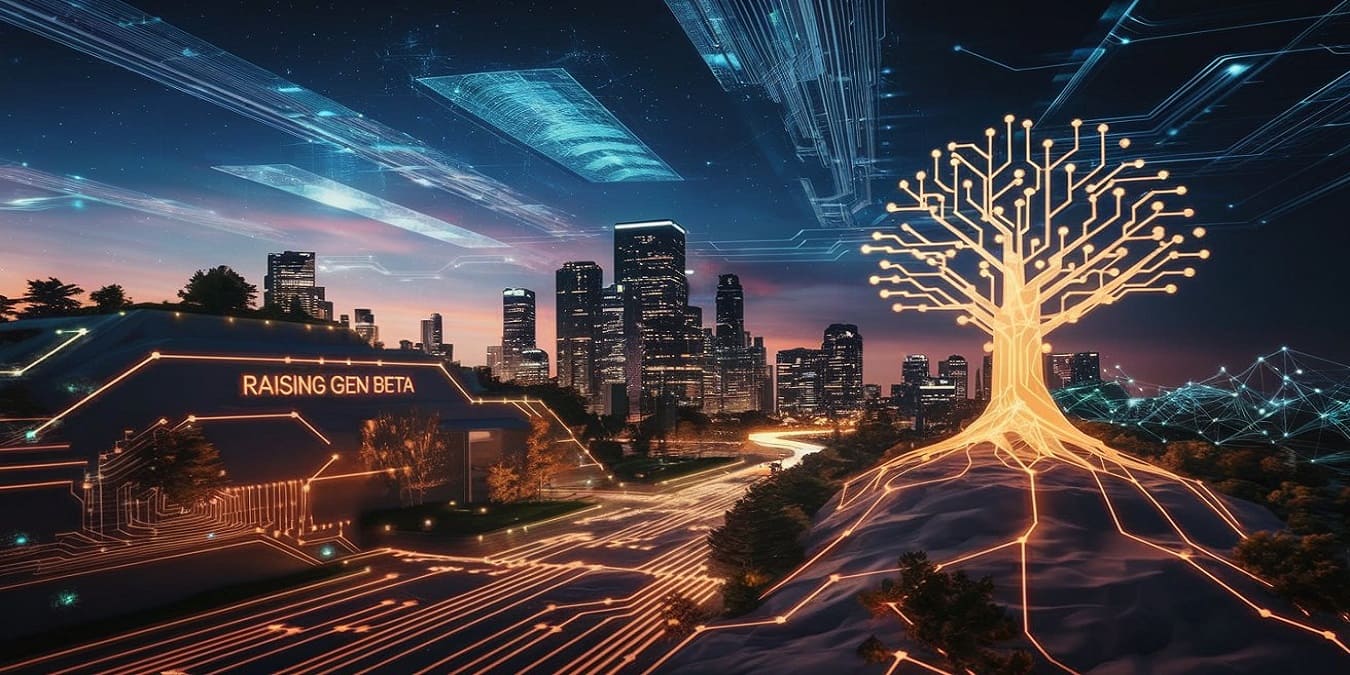
Raising Gen Beta: Navigating the Challenges and Opportunities of the AI Era
The world is changing fast, so fast, in fact, that children born today are growing up in an entirely new era. Welcome to the age of Artificial Intelligence (AI). As parents, educators and caregivers, how can we possibly prepare for a future that is still unfolding, one where our children, Gen Beta, will have to navigate landscapes we’ve only just begun to understand?
“Raising Gen Beta” in the AI era presents both a unique set of challenges and incredible opportunities. In this blog post, we’ll explore how to raise children who will thrive in an AI-dominated world, where technology, ethics and human development intersect in new ways.
The AI Era: A Double-Edged Sword
What does it mean to raise children in the AI era? This is not a theoretical question; it’s a reality we are already living in. We are in the midst of the Fourth Industrial Revolution, where AI, automation and machine learning are reshaping every facet of society, from how we work, to how we interact, to how we educate the next generation.
Gen Beta, children born 2025 onwards, will never know a world without AI. Whether it’s the AI assistants in our homes, self-driving cars on the streets or algorithms recommending our next binge-worthy show, AI is woven into the fabric of daily life. In fact, one could argue that we are only scratching the surface of what AI will become in the next few decades.
Technologies like OpenAI’s GPT-4 (released in March 2023) and emerging innovations in healthcare, entertainment and education are just a glimpse into what is possible.
As a parent or teacher, this raises pressing questions:
- How do we ensure our children understand the technology around them without being overwhelmed by it?
- What skills will they need to succeed in a world where machines may be smarter, faster and more efficient than humans?
- How do we balance the benefits of AI with its ethical and social implications?
Let’s dive into these questions and explore how we can raise the next generation to thrive in an AI-powered future.
Understanding Gen Beta’s Relationship with AI
Gen Beta is growing up with AI as an omnipresent force in their lives. From smart toys to AI-driven educational tools, children will have unprecedented access to digital environments. But while this opens up a world of possibilities, it also comes with potential pitfalls.
Imagine a typical Gen Beta child, let’s call her Emma, growing up in a world where everything is connected, from her toys to her school assignments. Emma’s early experiences will likely include AI-driven learning apps that adapt to her individual needs, recommend books and activities based on her interests and even monitor her health through wearable tech.
AI will be an ever-present companion in her life, guiding her decisions and shaping her understanding of the world.
But this raises the question: How much is too much? Can we trust AI to replace human interaction and judgment? In an era where AI can predict behavior and make decisions for us, we must consider the importance of human touch, intuition and emotional intelligence in child development.
The AI Features Shaping Gen Beta’s World
AI is not just a buzzword anymore, it’s a reality embedded in many aspects of life. Here are some key AI features that will play a significant role in shaping the Gen Beta experience.
- AI-Powered Learning: With tools like Duolingo, Khan Academy and personalized learning apps, AI can adapt to a child’s learning pace, helping them understand subjects more deeply. This personalized approach can be particularly beneficial for children with different learning styles and needs.
- Smart Assistants: Devices like Amazon’s Alexa, Google Assistant and Apple’s Siri can become an integral part of a child’s routine, assisting with tasks, answering questions and even fostering creativity. These AI assistants are becoming more intuitive, understanding context and even learning from the child’s behavior.
- Virtual Reality (VR) & Augmented Reality (AR): AI-driven VR and AR tools are revolutionizing how children interact with the world. From virtual field trips to immersive learning experiences, these technologies provide a dynamic way to engage children and stimulate their imaginations.
- AI in Healthcare: With AI advancements in diagnostic tools and health monitoring, children today will have access to more accurate and personalized health care, often in real-time, thanks to wearables and smart devices.
- Robotic Companions: Robots like Softbank’s Pepper or AI-driven virtual companions for elderly care are making their way into households. These AI robots can provide companionship and even teach social-emotional skills, though they come with their own set of ethical considerations.
The Challenges of Raising Gen Beta in the AI Era
As parents, we must ask ourselves: How do we ensure that Gen Beta doesn’t simply become passive consumers of technology, but active, critical thinkers who understand its power and limitations?
Here are some of the most pressing challenges.
-
Over-Reliance on Technology
While AI can offer incredible benefits, there’s a real risk of over-reliance. As AI becomes more embedded in daily life, children may begin to depend on it for tasks that they should learn to handle independently, such as problem-solving, decision-making and social interaction. The challenge here is to find a balance between using AI tools and encouraging independent thinking and creativity.
-
Ethical Implications of AI
AI is only as good as the data and algorithms that power it. Gen Beta will need to learn not just how to use AI, but how to understand its ethical implications. Who owns the data? How is AI being used to influence opinions and behaviors? What happens when AI makes a mistake? These questions will need to be addressed as AI becomes more integrated into society.
-
The Digital Divide
AI tools are not equally accessible to everyone. Children from underserved communities may not have the same access to AI-powered educational tools, which could exacerbate existing inequalities. As a society, we must work to ensure that AI’s benefits are accessible to all children, regardless of their socioeconomic background.
-
Impact on Social Skills
There is a growing concern that children raised with AI will miss out on key social interactions. Machines cannot replicate the depth of human connection and face-to-face communication remains essential for emotional and social development. How do we foster empathy, collaboration and emotional intelligence in an increasingly AI-driven world?
Opportunities for Gen Beta in the AI Era
Despite these challenges, the AI era also offers tremendous opportunities for Gen Beta. By leveraging AI, children can develop skills that are more important than ever: creativity, critical thinking and emotional intelligence. Here’s how we can use AI to our advantage.
-
Personalized Learning
AI’s ability to create customized learning paths for children means that education can be more tailored to individual strengths and weaknesses. This personalized approach can help children excel in areas where they struggle while allowing them to explore their passions at their own pace.
-
Preparing for the Jobs of Tomorrow
AI is transforming industries and Gen Beta will need to be equipped with the skills to thrive in this new economy. While AI will take over some tasks, it will also create new jobs that don’t even exist yet. Children who grow up with a strong understanding of AI, data analysis and coding will be well-positioned for these emerging careers.
-
Creativity and Innovation
Rather than replace human creativity, AI can amplify it. Gen Beta can use AI tools to design, create and innovate in ways that were once impossible. Whether it’s through music composition, art generation or game development, AI can help children push the boundaries of their creativity.
-
Building Global Connections
AI-powered platforms can connect children from across the globe, fostering collaboration and cross-cultural exchange. Through AI, Gen Beta can become true global citizens, learning from diverse perspectives and engaging with others in real-time.
Balancing the Benefits and Risks of AI
In raising Gen Beta, we must take a thoughtful, balanced approach to AI. Technology is not inherently good or bad; it’s how we use it that matters. Here are some key strategies to help Gen Beta navigate the AI era:
- Encourage Digital Literacy: Teach children about how AI works, its potential and its limitations. This will empower them to make informed decisions and critically assess the technologies they interact with.
- Promote Emotional Intelligence: While AI can simulate human emotions, it cannot replace genuine human connections. Encourage children to build empathy, communication skills and emotional resilience through real-world interactions.
- Foster Problem-Solving Skills: Rather than letting AI do everything for them, encourage children to use it as a tool to enhance their problem-solving abilities. This will help them think critically and creatively in a world where AI will increasingly handle routine tasks.
- Set Boundaries: Just as we limit screen time today, we must also establish boundaries around AI use. Children should be encouraged to engage with AI in a way that enhances their lives, not dominates them.
Conclusion: Raising Gen Beta in the AI Era
In the rapidly evolving AI landscape, raising Gen Beta presents both challenges and opportunities. By understanding the role of AI in their lives, we can help children develop the skills they need to navigate this new world with confidence. This includes fostering creativity, critical thinking, emotional intelligence and a deep understanding of the ethical implications of AI.
Ultimately, the key to raising Gen Beta in the AI era is not to shield them from technology, but to empower them to use it wisely. With the right guidance and support, the children of today can thrive in the AI-powered world of tomorrow.
Raising Gen Beta means preparing them for an unpredictable future, where the challenges of the AI era are met with innovation, resilience and human connection. Let’s embrace this journey together and ensure that the next generation is not just ready for the future, they’re ready to shape it.














